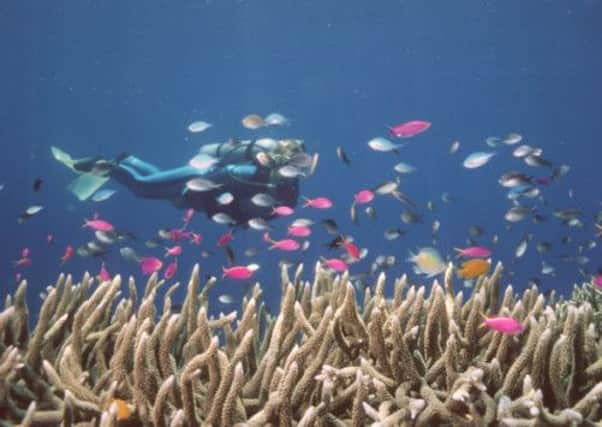World’s oceans facing climate change triple threat


A review of studies into the condition of global oceans has revealed the rate and destructive impacts of climate change are “greater, faster and more imminent” and the consequences “far graver” than previously estimated, prompting calls for urgent action.
A set of five papers published by the International Programme on the State of the Ocean (IPSO), a consortium of scientists and marine experts, and the International Union for Conservation of Nature (IUCN), a global environmental network, warns that our seas are taking the brunt of global warming by absorbing much of the temperature rises and “unprecedented” levels of carbon dioxide.
Advertisement
Hide AdAdvertisement
Hide AdScientists working on the papers say acidification, warming and de-oxygenation, combined with ongoing overfishing, will have serious consequences for marine life and the ocean’s ability to act as the earth’s “buffer” for climate change. Destruction of fragile ecosystems such as coral reefs and mass extinction of important species may be almost inevitable, they warn.
Pollution, illegal fishing and carbon dioxide emissions from fossil fuels have contributed to the oceans being at their most acidic in 300 million years. The rate of carbon release is at least ten times faster than before the last major species extinction – the Paleocene Eocene Thermal Maximum extinction, about 55 million years ago.
“The scale and rate of the present-day carbon perturbation, and resulting ocean acidification, is unprecedented in Earth’s known history,” according to the report.
IPSO scientific director and lead author of the study Professor Alex Rogers, of Somerville College, Oxford, said: “The health of the ocean is spiralling downwards far more rapidly than we had thought. We are seeing greater change, happening faster, and the effects are more imminent than previously anticipated.
“The situation should be of the gravest concern to everyone since everyone will be affected by changes in the ability of the ocean to support life on earth.”
Environmentalists fighting to preserve Scotland’s seas say the findings highlight the need for the Scottish Government to establish a network of designated Marine Protected Areas.
Calum Duncan, convenor of Scottish Environment LINK’s marine taskforce and Scotland programme manager of the Marine Conservation Society charity, said: “This IPSO report plainly shows that if we don’t take the threat of climate change seriously, our seas will suffer.
“We have an opportunity right now to tackle this, but are concerned that the Scottish Government is currently pursuing a contradictory dual-agenda; maximising the exploitation of our oil and gas reserves is simply not compatible with reducing the greenhouse gas emissions. The draft National Marine Plan must embed a more ambitious strategy to make the smooth transition towards a low-carbon economy.”